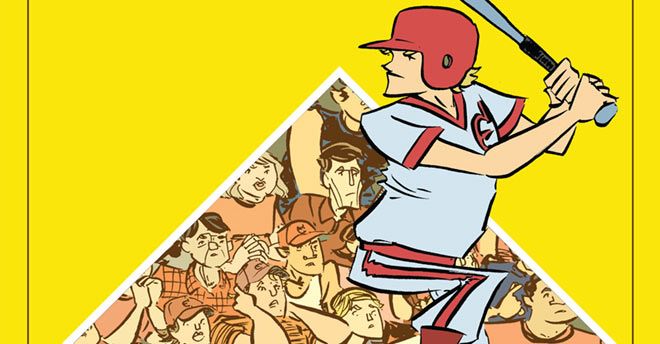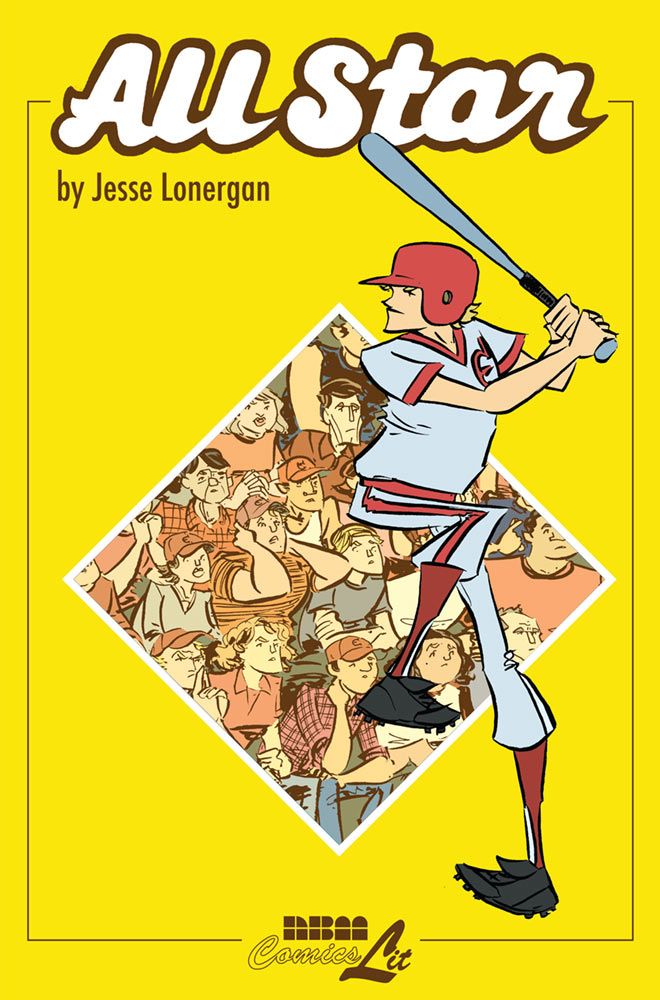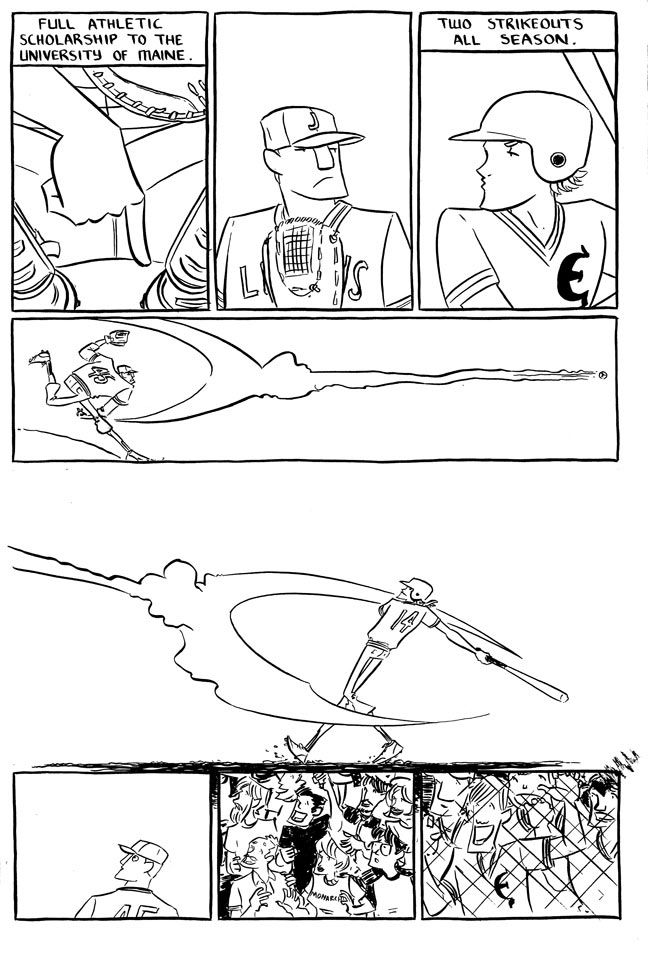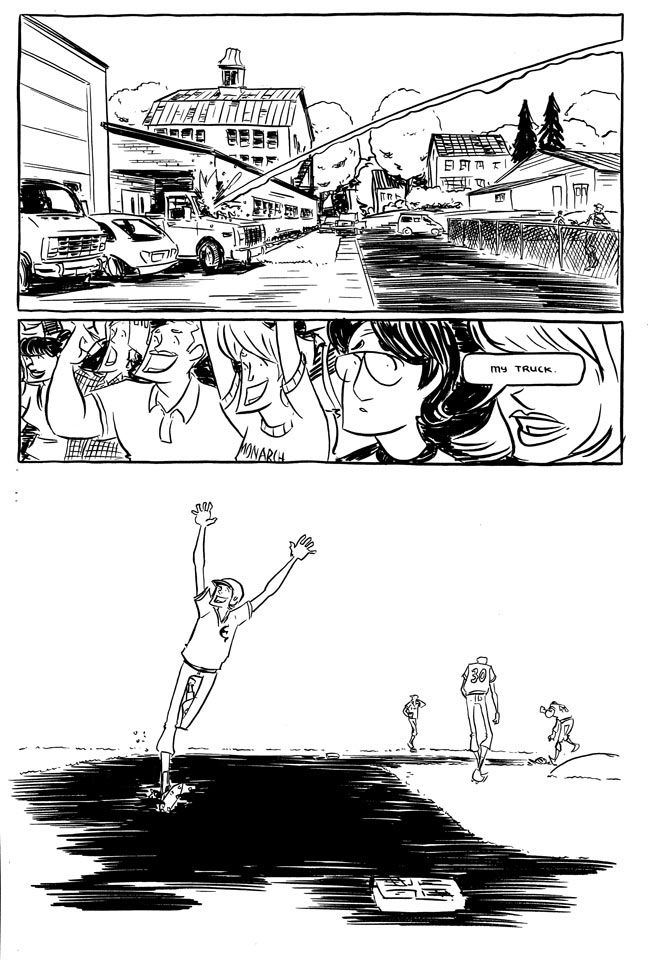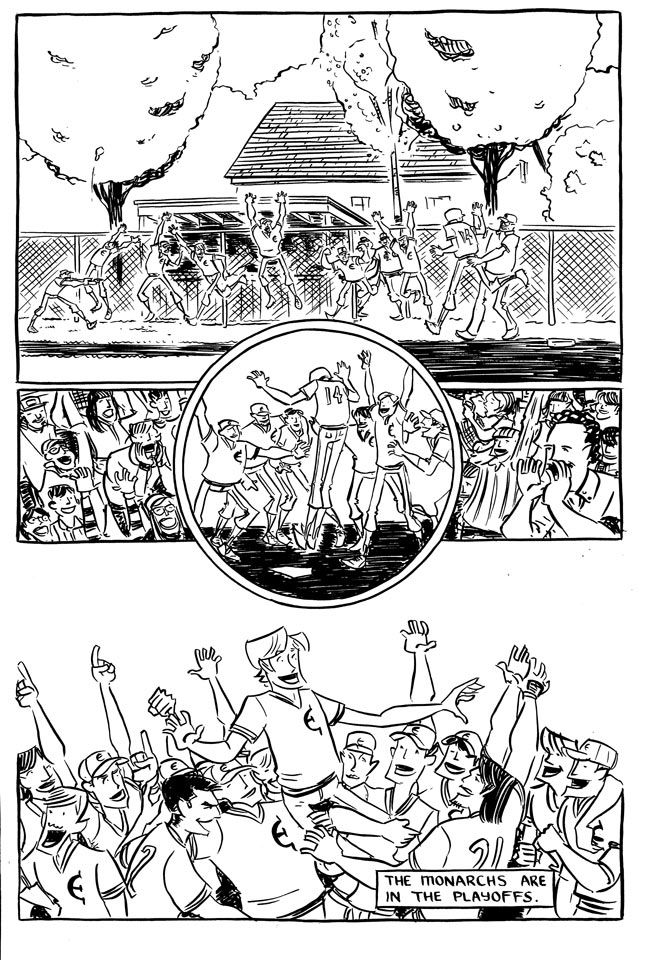With his graphic novels "Joe and Azat" and "Flower and Fade," as well as on his blog, cartoonist Jesse Lonergan has demonstrated his unique voice and his skill at body language and dynamic motion. His latest book, "All Star," tells the story of a high school baseball player who seems to lead a charmed life, until he makes a mistake in his senior year of high school. This turn of events threatens the star athlete's future and causes him to look at his life in a deeper way than he has previously.
"All Star" is a thoughtful coming of age story, providing a look at small town life while, through Lonergan's angular linework, masterfully depicting baseball games, many of which he lets unfold without words. The book, which is available now from NBM Publishing, debuted earlier this month at the MoCCA Festival.
CBR News: Where did the idea for "All Star" originate?
Jesse Lonergan: It started with this memory from Little League. It was practice, and I was pitching. The batter was this big kid, Larry, who was two years older, which is a big deal when you're ten. I couldn't throw hard, but I was accurate and I struck him out on three pitches. He was furious that this younger kid had struck him out and demanded another pitch. He creamed that next one, a line drive straight at me and right into my glove. He threw his helmet and slammed his bat. That was the first scene that I had in mind for "All Star," and the story spread out from there.
Are you a baseball fan?
Yeah. I wouldn't say I'm a diehard, but I go to four or five Red Sox games a year. I always find the sight of a field comforting.
As much as the book is about baseball, it's also about small town life. How important was that aspect of the book to you when you started the book?
I grew up in a town of around a thousand people, and I think it had a huge effect on me, on the way I think and how I look at the world. It's kind of the opposite of the sterility of suburbia people talk about. There are the literal elements, like a backyard ending in a barbwire fence with cows on the other side, or a dead, gutted bear hanging from a tree in hunting season, but there is a social aspect as well. There aren't many secrets. There isn't any anonymity, so you know a bit more about the people around you. I think in a bigger place, you can be more isolated; the social and economic stratification keeps people apart. But in the country, you don't have enough people for that to happen. You're all mixed together.
Of course, when I was a kid, I didn't have these ideas. It wasn't really until I went back to my hometown after college and [spending] a couple of years in Chicago that I really began to appreciate how special the place I grew up was.
Why did you decide to set the book in this particular era?
In large part, it was practicality. I was in high school in the 1990s, so it's easier for me to write with confidence about high schoolers in that time period. The internet hadn't become the dominant presence that it is. People still had dial-up. Nobody had a cell-phone. I don't think kids now are that different from kids then, but there's probably nothing worse than a thirty-five-year-old cartoonist trying to guess what kids these days are into.
I chose 1998 specifically because it was the year of the home-run chase between Sammy Sosa and Mark McGwire. Their glory at the time, combined with the steroid scandals and shaming that followed, seemed to be a good way to help set the scene, but also to underline the complexities that the main character is facing.
Carl is someone who has advantages, and this is a coming of age story in the sense that this is the story of how he starts to become conscious of that and what it means.
I like that interpretation. Questions of fairness, privilege, and preferential treatment were all things that I was thinking about while I was writing the book.
I couldn't help but think about how people often want to return to this idea of sports, where it's a game without all these other issues, whether steroids or anything else, and be something pure. You're saying that's a myth. Sports are almost always about life -- like most things.
I don't really think it's a myth. There is a simplicity to games. There are clear rules, much clearer than you'll get anywhere else in life. I think games are pure, but they're played by people, and people are flawed.
I'm curious how you approached writing and drawing the baseball games, because you often depict them without any dialogue.
The baseball scenes weren't approached any differently than other scenes. I try to use dialogue only when it is necessary, and in those scenes, I didn't think it would add anything.
In general, I write in comic form without a script. I hold the scene in my mind and draw it in panels in a sketchbook. Later, I'll edit and cut panels which I think are superfluous. This method works for me because it keeps me focused on the visual aspect of comics; it keeps me from getting too wordy. It's just a personal preference, but I try to keep from cluttering the page with text.
The ending, where for many pages, there are very few words -- did you know this was the end when you started?
I always knew that the final scene would be on a baseball field. "All Star" begins on the field, and it makes sense that it should end there. The baseball field is where Carl is at his best. It's a place where he has no worries, where he is king. At the conclusion of the story, the rest of life, responsibilities and constraints, are beginning to encroach on that domain. For Carl, baseball has stopped being a game and become something else, something sullied by the complexities of adulthood. I prefer for that idea to be expressed visually, without words. I think without dialogue it becomes something that the reader feels rather than thinks. If it's put into words, I feel it doesn't have the same the effect.
You've talked on your blog about two other projects you're working on: "Vengeance" and "The Sex Sex." Can you talk a little about them?
"Vengeance" is the next big project for me. It's about a faith healer wrongly executed by the powers that be in an old west town and how she gets revenge from beyond the grave. It's a bit of a departure from my previous work as it's not based in reality and delves into the fantastic.
"The Sex Sex" is the story of the greatest rock and roll band of all time. I'm a bit of music geek, and "The Sex Sex" is my place for geeky jokes, hyperbole and winks. It's like a puzzle for me. I play with the pieces every now and then, and occasionally I get ideas of putting it all together, but then I'd have to glue the pieces down.
Before we go, and because the season just opened, I feel I should ask: What are your thoughts on the Red Sox's prospects for this year?
I really expected very little at the beginning of last season, and then they ended up winning the World Series, so I'll stay away from making any predictions. I'm just a guy who draws comics.

